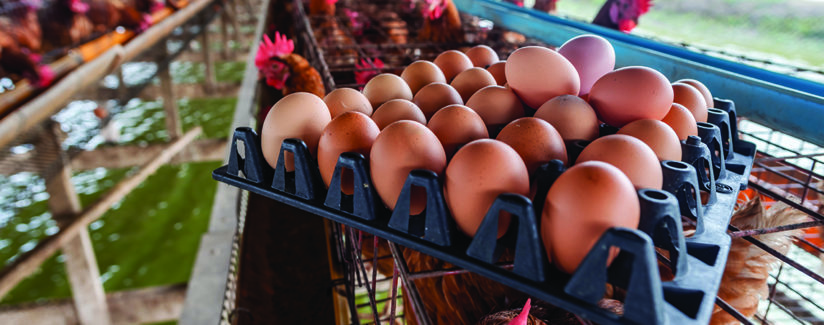
What’s the Difference Between Cage-Free and Regular Eggs?
08/16/2019
Cage-free eggs are becoming more popular at retailers and restaurants. That means more options for shoppers when choosing eggs and more questions to consider.
Which eggs are healthiest? Why do some eggs cost more? Which housing system is best for the hens? We got in touch with Dr. Darrin Karcher, Extension poultry scientist for Purdue University, who helped us understand about different types of eggs.
What makes cage-free eggs different?
Eggs that are labeled “cage free” indicate the type of housing that the hens live in, Dr. Karcher explained.
“The U.S. Department of Agriculture regulates the labels on cartons. There is a definition that the egg producers must abide by in order to be able to put that claim on the carton,” he said.
A “cage free” label on a carton of eggs means they have been laid by hens that are able to roam vertically and horizontally in indoor houses, according to the U.S. Department of Agriculture. Cage-free housing can vary from farm to farm. Cage-free hens typically live inside barns. This is slightly different than eggs that are “free range,” which means the hens have access to the outdoors.
Why do some eggs cost more?
Cage-free eggs usually cost more at the store for the simple reason they are more expensive to produce. Special sales and marketing promotions sometimes make the price of cage-free eggs appear more comparable to regular, or conventionally produced eggs.
“At the end of the day it truly is a more expensive housing system for producers to produce that cage-free egg compared to a conventional egg,” Dr. Karcher said. “With cage-free eggs, we have more investment as a producer in the housing system itself. We have more investment in labor because workers are walking among the birds picking up eggs off the floor.”
In addition to the cost of the barns and housing units, there are other factors, such as higher feed costs.
“It’s housing driven, but there’s all the other things that go into producing the egg that ends up making it more expensive,” Dr. Karcher said.
Most hens are raised in conventional cages. These eggs are usually the most affordable to purchase.
“They tend to be the cheapest because it is the most efficient way to produce that protein cost effectively,” Dr. Karcher said.
Are cage-free eggs healthier?
There is no difference in nutrition between cage-free and conventional eggs, Dr. Karcher said.
“Unless there is something on the carton that would indicate it is more nutritious, the egg from a cage-free system is no different nutritionally compared to any other egg that could be produced,” he said.
Eggs that have specific nutrition characteristics, such as additional vitamin A or vitamin E, will be identified on the carton.
For Dr. Karcher and his family, the choice is conventional eggs.
“I buy the cheapest eggs because I have five kids and we go through eggs like nobody’s business. I know nutritionally there is no difference,” he said.
Are cage-free eggs safer?
Consumers can be confident that all types of eggs purchased from retailers are safe, Dr. Karcher said. Multiple government agencies, including USDA and FDA, oversee eggs offered for sale.
“It’s important for consumers to understand that the level of regulation from a food safety and quality perspective for all eggs is very high. In order for those eggs to be marketed, they have to abide by qualifications that involve testing to ensure they are receiving a safe, nutritious product,” Dr. Karcher said.
Which is best for the hens?
Cage-free and conventional barns can both provide humane housing for hens, Dr. Karcher said. A study by the Coalition for Sustainable Egg Supply found that each system had tradeoffs for animal welfare.
“Irrespective of the type of housing system, there are animal welfare certification programs that producers follow,” he said. These include programs such as United Egg Producer Certified and American Humane. “Those programs have scientific advisory boards, so hens are all humanely raised irrespective of the housing system.”
The programs are often listed on the egg carton, so shoppers can identify eggs that were produced following humane guidelines.
How do you choose what type of eggs to buy?
Dr. Karcher encourages consumers to learn more about the different approaches to egg production so they can understand what they each involve for caring for hens. Check out these resources for more information.
“Then you can identify based on your beliefs the type of eggs that you choose to buy,” he said. “In some instances, we recognize that we all have the ideal world that we’d all like to be in, but it ultimately may be driven by price. That is okay. There is nothing wrong with that.”
Among the different types of eggs, all are safe and a good source of protein, vitamin A and vitamin D.
“It just comes down to educating yourself and making the decision that fits what you firmly believe,” Dr. Karcher said. “You do not have to feel guilty about buying affordable eggs.”
Cage-free eggs and conventional eggs are the same for nutrition and safety. Cage-free eggs come from hens that live in a type of housing that is different than conventional housing, which is why they often cost more. The egg carton will indicate if the eggs are from a farm that follows programs for the humane treatment of animals.

























